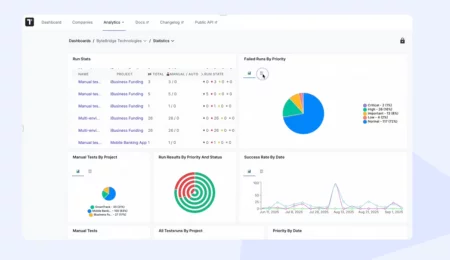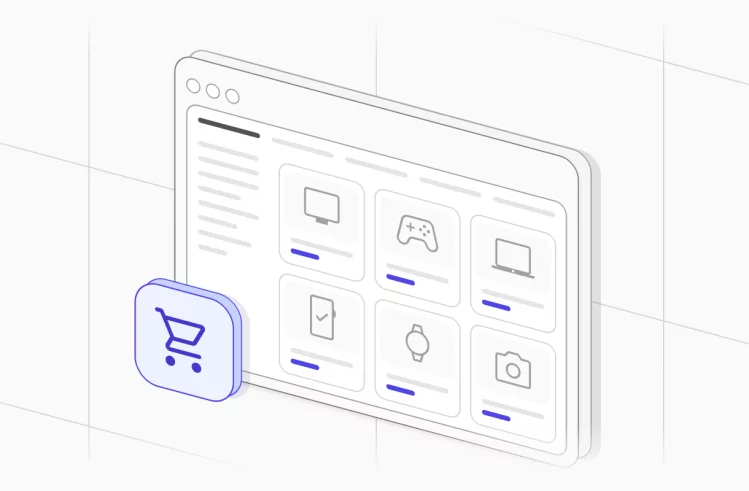You know how frustrating it can get when your company’s main software crashes during peak business hours? This is the main reason enterprise application testing is so important. We’ve got direct eyes on these behemoth, mission-critical systems that keep the lights on at your business, your enterprise resource planning systems, customer relationship management tools, banking software, and supply chain management systems.
What is enterprise application software, really? Think of it as the digital backbone of large organizations. Such enterprise applications manage everything such as payrolls, inventory management, etc, and often thousands of users access them at once, processing sensitive data of millions of dollars worth. A malfunction impacts an individual, and it can unglue the entire operation and have a devastating effect on customer experience.
The fact is that testing enterprise applications demands an entirely new strategy in comparison with smaller projects. You have got wildly complex integrations, really tight regulatory compliance and testing requirements that would lead most quality assurance teams into a cold sweat. This is where dedicated enterprise testing software such as Testomat.io comes in, because real-world enterprise level operations require all the features that only such a software can bring to the table.
The Real Challenges of Testing Enterprise Applications
Enterprise testing is a beast of a different nature. We’re not talking about a few hundred test cases here. A typical enterprise software system might have tens of thousands of test cases spread across dozens of modules.
| Challenge | Problem | How Testomat Helps |
| Complex Testing Scenarios | Enterprise applications often require testing from basic authentication to complex workflows across multiple departments. Managing roles, permissions, and data combinations adds complexity. | Flexible Workflows: Testomat adapts to both manual and automated testing, streamlining complex workflows, no matter how intricate. |
| Integration Nightmares | Modern apps rarely work in isolation. With external APIs, third-party services, and legacy systems, integrations are constantly at risk of failure, impacting user experience. | Integration Testing: Testomat offers built-in features for validating API connections, handling legacy system issues, and testing under various conditions like network failures and timeouts. |
| Security & Compliance | Enterprise systems handle sensitive data like customer financials, healthcare records, and proprietary information. A single breach can cost millions and damage reputations. | Comprehensive Security Testing: Testomat supports rigorous security testing to validate permissions, encryption standards, and threat detection. It also ensures compliance with regulations like HIPAA, GDPR, and others. |
| Coordinating Distributed Teams | Large organizations have multiple teams working across different parts of the same system, often using diverse tools and processes. Poor coordination leads to redundancy or missing tests. | Collaboration & Coordination: Testomat centralizes all testing efforts, ensuring cross-team visibility and helping to avoid double testing or missed scenarios. |
| Need for Speed in CI/CD | In the age of CI/CD, release cycles are faster than ever, putting pressure on testing teams to deliver quick, thorough feedback without delay. | Rapid Feedback with Automation: Testomat’s automation tools ensure fast feedback, from unit tests to end-to-end testing, while maintaining the integrity of your tests across multiple release cycles. |
How Testomat.io Tackles Enterprise QA Challenges Head-On
The approach of Testomat.io to the scale issue is smart organization features which make sense when dealing with large operations. Instead of forcing teams to work with rigid structures that don’t match their reality, the platform allows flexible organization through tags, suites, and folders that mirror how enterprise applications are actually built and maintained, supporting various types of enterprise software applications.
The cross-project visibility aspect solves one of the largest enterprise application testing headaches which is, what is going on in other groups and sections. Software test management professionals will be able to monitor progress of numerous projects at the same time and different projects highlight areas of problems and knowledge of where crucial integration points should be observed and to cover sufficient testing ground.
The search and filtering functions allow substantial amounts of time to be saved treating thousands of test cases. Instead of scrolling through a never-ending list in the hopes of finding what they are looking for, quality assurance teams would be able to narrow down what they need within a few clicks, by way of tags, requirements, or any other customizable attribute that would make sense to their organization. This business testing tool methodology will maintain a high quality of software and it will increase efficiency
Seamless CI/CD Pipeline Integration
The native connectivity into widely-used CI/CD testing automation software (such as Jenkins, GitHub Actions and GitLab CI) is also available. These integrations are automatic and thus these make no need of frequent maintenance or configuration upgrades throughout the development phase.
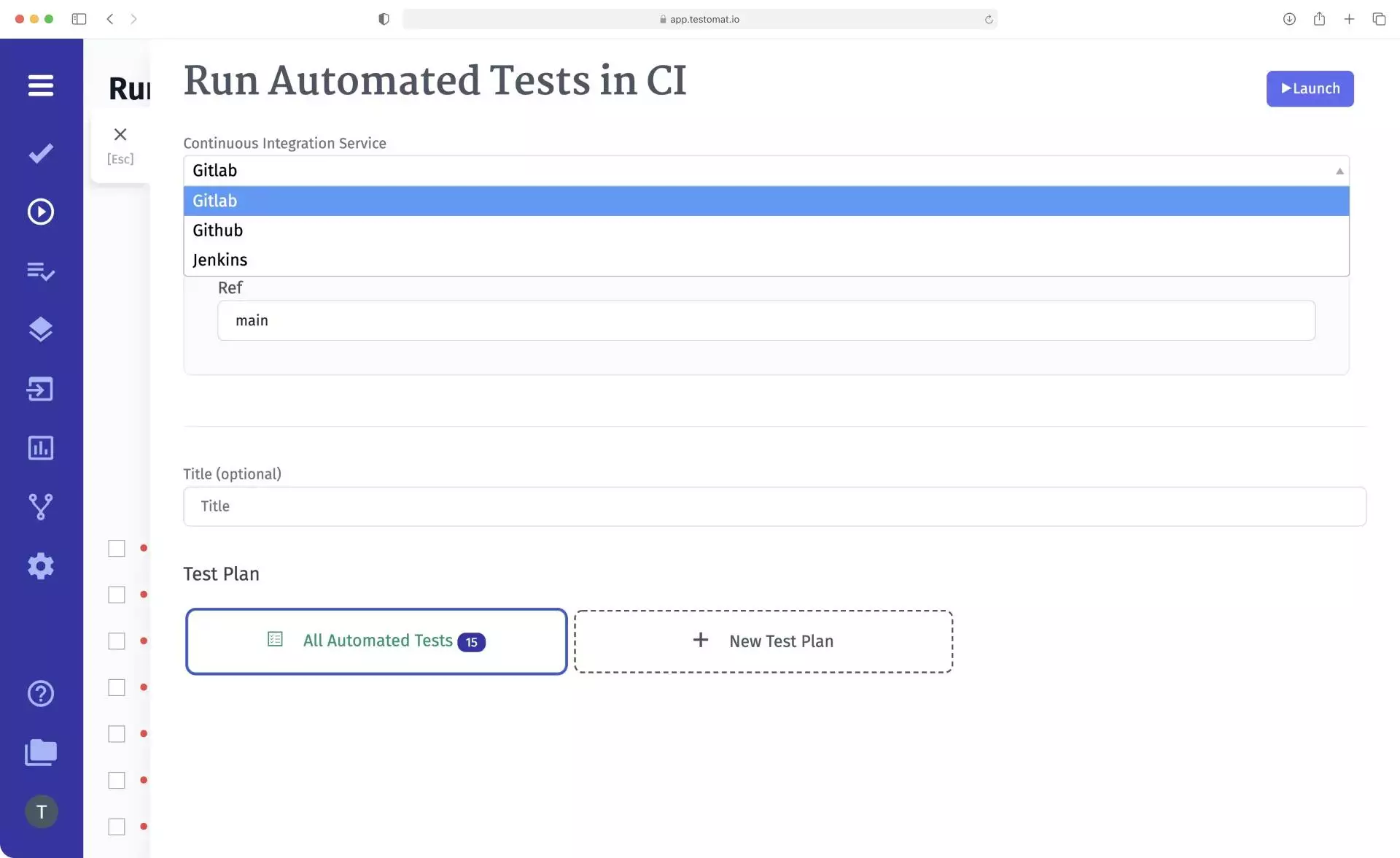
The integration is carried out on a real-time basis hence test results are made available instantly after running a test allowing swift decisions to be made concerning deployment of codes. In enterprise applications, where deployment windows may be somewhat fixed to a maintenance window, a faster system may mean the difference between meeting business requirements, and incurring stakeholder disappointment without any discontinuity in business itself.
The capability to invoke enterprise-level test runs within the pipeline support advanced test strategy options. The various test suites can be set to run in different teams according to the nature of changes being deployed, in that no wastage of resources on unnecessary tests will be done. This ability in test automation it allows both manual and automated procedures.
Continuous Testing Strategies
Enterprise apps can make use of continuous testing methods whereby feedback is given continuously about the functionality of the system. Among these is automatic regression testing which can be carried out outside the day’s work and so there will be no negative effects on the productivity of development teams since potential problems can be caught instantly without wasting the efforts of the individuals.
Effective continuous testing also includes intelligent alerting that notifies appropriate team members when issues occur without creating notification fatigue. The alerting system should be configurable to match organizational structure and escalation procedures, ensuring that critical issues get immediate attention while routine matters are handled through normal channels, supporting overall business continuity and project management goals.
Comprehensive Traceability and Reporting
Enterprise applications require detailed traceability between business requirements, test cases, and code changes. Testomat.io provides robust linking capabilities that connect all these elements, enabling teams to understand the business impact of test failures and prioritize fixes based on actual business value while ensuring functional requirements are met.
The customizable reporting features provide insights that enterprise teams actually need – test coverage metrics, identification of flaky tests that cause unnecessary delays, and trend analysis that reveals patterns in software quality over time. These analytics help teams make data-driven decisions about where to focus their testing efforts and how to improve overall efficiency while tracking key metrics for project management.
BDD and Gherkin produce business readable test examples that bridge the communication gap between tech and business teams. For enterprise applications where business logic can be incredibly complex, this capability ensures that subject matter experts can validate that tests actually cover the scenarios that matter most to the organization, supporting functional testing and application testing needs.
Enterprise-Grade Collaboration Features
The platform also supports collaboration by allowing multiple persons to join in shared dashboards that provide real-time view of test execution and results. The information is available to all stakeholders, including QA engineers, product managers, business analysts among others, and they do not need to be equipped with technical knowledge to understand the outcomes of the tests being performed, and that is improving customer experience with the testing process.
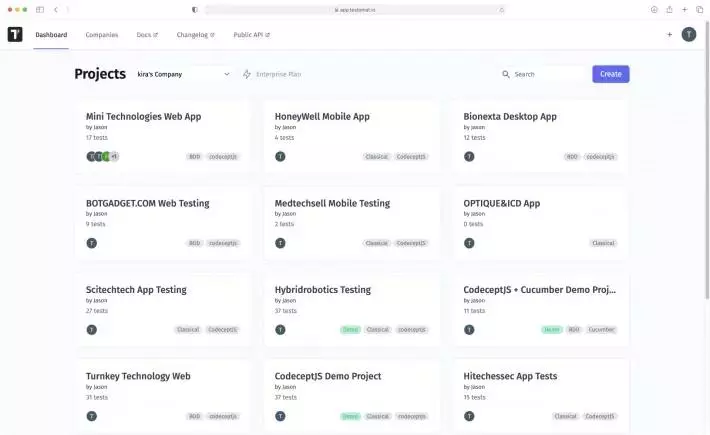
Role-based access control mitigates the threat of sensitive information and testing information being obtained by the wrong parties as well as allowing collaboration as necessary. It is essential to an enterprise that uses regulated data or has proprietary business processes.
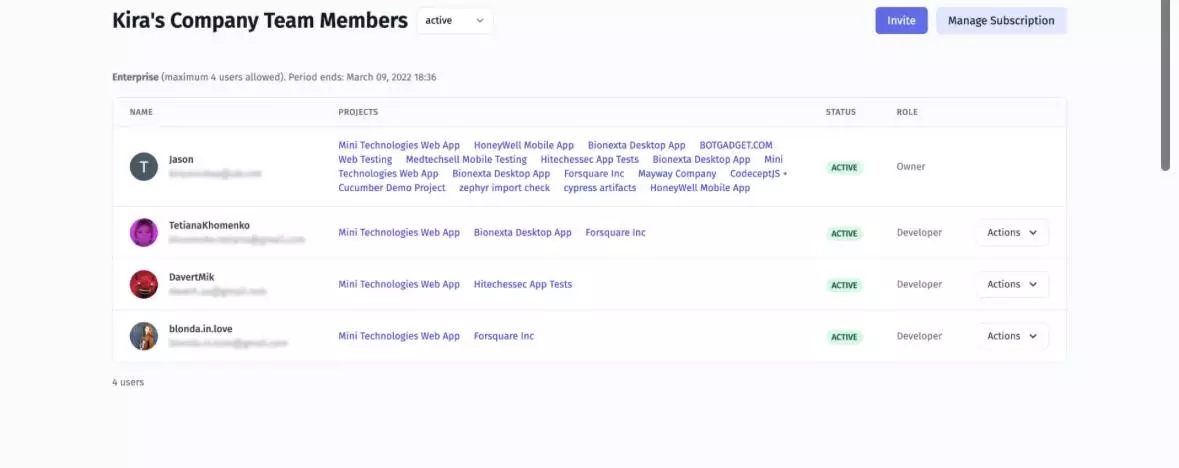
Access controls can be tailored to suit your exact organizational hierarchy and safety precisions, to be sure of regulatory compliance and comply with industry regulations.
Proven Best Practices for Enterprise Testing Success
The effective enterprise testing strategies should be open to both shift-left and shift-right tactics. Shift-left testing has quality testing activities earlier in the development process when costs are lower to correct. This also involves such reviews as requirements, design validation and early development of test automation scripts.
Shift-right testing extends quality assurance into production environments through monitoring, user experience, feedback analysis, and production testing strategies. In the case of enterprise applications, these may include synthetic transaction verification that ensures critical business processes logs 24/7; performance test monitoring that follows system behavior under real-load conditions which is also supported by the rapid crash recovery system and live support.
Smart Test Data Management
Enterprise applications often require large volumes of test data that accurately represent realistic business scenarios. Creating and maintaining this data can be expensive and time-consuming, especially when dealing with complex business rules and data relationships across supply chain operations and other critical processes.
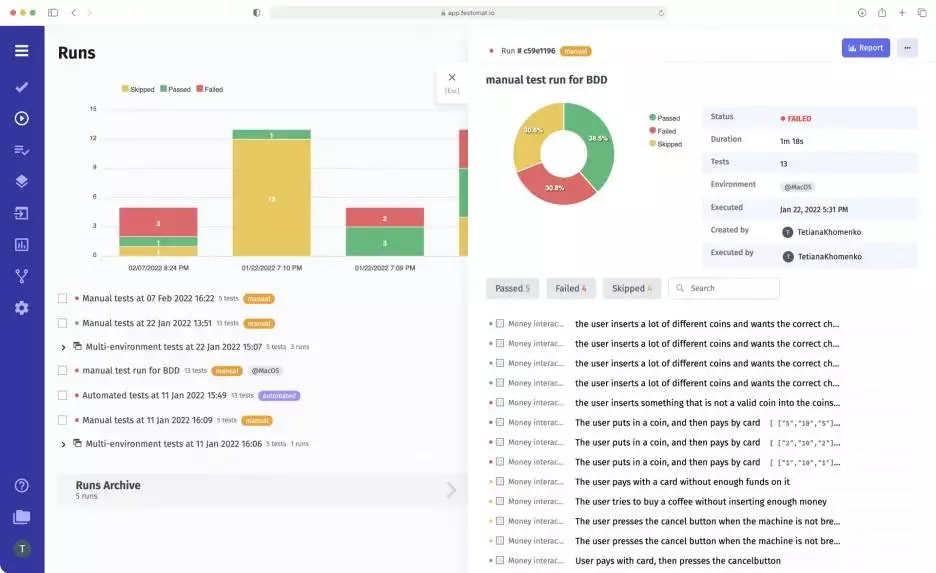
Effective test data strategies emphasize reusability, enabling teams to efficiently validate different scenarios without duplicating data creation efforts. This becomes particularly important when testing different devices or compatibility testing scenarios that require the same underlying business data while ensuring comprehensive application coverage.
Privacy and security considerations add another layer of complexity to test data management. Teams need strategies for creating realistic test data that doesn’t expose sensitive data or violate regulatory requirements. This might include data masking techniques, synthetic data generation, or carefully controlled access to sanitized production data subsets that maintain data security while supporting thorough testing. There are also functions like Version Control, Branges, History Archive, Reverting changes, Git integration.
Leveraging AI for Intelligent Testing
Modern enterprise testing benefits from artificial intelligence capabilities that can analyze patterns, suggest test scenarios, and identify high-risk areas based on code changes and historical data. These intelligent features help teams focus their testing efforts where they’re most likely to find issues or where failures would have the highest business impact on customer experience.
AI-powered test generation can create comprehensive test suites more efficiently than manual testing approaches, while intelligent analysis of test results helps identify patterns that might not be obvious to human reviewers.
Testomat.io’s Enterprise Plan: Built for Scale
Most of the abilities, which large firms need to handle extensive test management, are covered in the Enterprise Plan. The pay-per-user payment system and unlimited projects will allow organizations to ramp up their testing activities without project based restrictions which may limit the scope of the tests unnecessarily.
- Security options contain Single Sign-On integration and SCIM support to facilitate automated user provisioning, so that access control is properly in line with corporate security measures. The self-hosted deployment adds data sovereignty and the extra security that an organization may need to its needs in areas where a high level of data handling is required.
- The enhanced AI functions such as test generation and suggestion support help teams to generate a thorough test coverage more productively. Using AI-equipped requirements management allows many organizations to retain traceability between their business requirements and testing activities, and the utilization of custom AI providers allows adoption into the preferred tools within organizations.
- The platform provides means to work with branches and versions to handle different releases and environments when it comes to testing. Bulk user management is convenient when an organization has many users, whereas granular role-based access controls allow dividing organizations into various roles and giving them corresponding rights.
- The cross-project analytics allows seeing the picture of testing effectiveness of the whole organization, allowing the leadership to understand its maturity and see areas of improvement. This platform can support even large enterprise applications based on up to 100,000 tests.
- Complete audit trails and SLA promises give enterprises the documentation and integrity that they need to support compliance initiatives and organizational confidence.
Ready to Transform Your Enterprise Testing?
Testomat.io provides the capabilities that enterprise organizations need to manage testing at scale while maintaining the quality and reliability that business operations require. The platform’s combination of intelligent organization, automation support, and collaboration features addresses the key challenges that enterprise testing teams face every day.
Consider evaluating how Testomat.io’s enterprise features could address your specific testing challenges. The flexibility of the platform allows it to be tailored to your organizational processes but will provide the standardization required to afford collaboration across large and distributed teams.
Enterprise onboarding support provides seamless implementation and swift adoption, with teams able to see tangible value now and lay the foundation of a broad and long term testing platform able to support ongoing business growth and innovation.
Frequently asked questions
What is enterprise software testing, and why is it important?

Enterprise software testing ensures that large-scale applications meet business needs, function well under stress, and comply with regulatory standards. Using the right tools like Testomat.io enhances performance and security, ensuring user satisfaction and preventing data breaches.
What role does automation testing play in enterprise application testing?

Automation testing streamlines repetitive tasks, making enterprise test cycles faster and more efficient.
How does regular security auditing help prevent data breaches?

Regular security audits and stress testing are crucial to identify vulnerabilities in enterprise software. Testing for compliance with regulatory standards and best practices safeguards web applications from potential data breaches, protecting both business and customer data.
How do I choose the right type of testing for my enterprise software?

The right type of testing depends on the specific business needs. Tools like Testomat.io offer comprehensive testing that covers various scenarios, ensuring the software aligns with both user satisfaction and enterprise goals.
